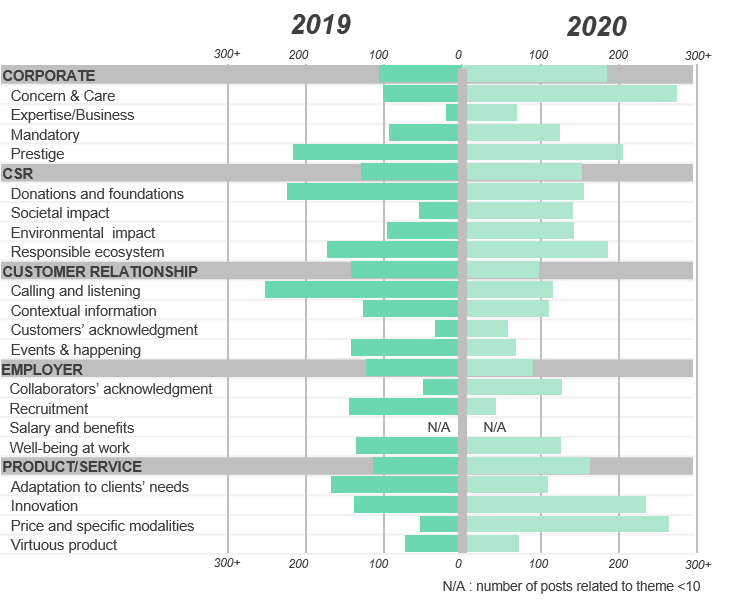Canadian Hydrogen Observatory: Insights to fuel…

On social media, brands have gone through the lockdown double-bind dilemma: how to nurture proximity while enforcing social distancing? Two key levers emerge from our Belgian study on brands and engagement on social media: responsibility and recognition. Discover the full results.
Just like in March, many Europeans have been called on to actively fight the virus, by simply staying home. It has become urgent again for everyone to limit their interactions outside home. In this context, how can companies continue to communicate with their customers? Taking into account the successes and lessons learned between March and May this year to adjust external communication seems a necessary step.
A study by Sia Partners shows that the themes addressed in companies’ communication on social networks between March and May 2019 and the same period in 2020 have evolved towards more institutional and Corporate Social Responsibility (CSR), to the detriment of the Product & Services and Customer Relationship communications.

Proportion of companies’ communications efforts in March-May 2020, and evolution compared to March-May 2019
A brand’s proximity to its customers can be measured in particular through the engagement that its publications trigger, i.e. interactions (reshare, comments) and reactions (likes) per publication. Coupled with an analysis of the publication themes, it appears that certain subjects are favored by the public because they meet specific expectations or interests.
The graph represents, in 2019 and 2020, the average number of reactions and interactions according to the theme of company publications. The longer the line, the more the subject resonates on social networks. The more the line moves to the right, the more that subject gained popularity in 2020.

Average reactions and interactions per publication and per theme, March-May 2019 and March-May 2020
There has been a sharp increase in reactions to publications related to “Collaborator acknowledgment” and “Customer acknowledgement”. By embodying collaborators and customers, a brand becomes more human and closer to consumers. Similarly, publications that are part of a social and responsible context are becoming more and more successful; the “Responsible ecosystem” and “Concern & Care” categories each gained an average of more than 50 reactions and interactions per publication between 2019 and 2020. Brands are embodied by the individuals who make them and by their inclusion in a broader social context.
Another point that resonates strongly with customers is the understanding of their issues and concerns. By communicating clearly on their “Prices and specific modalities”, companies who aim to adjust the way they operate and sell, have thus met with approval on social networks. Companies are fighting uncertainty by continuously adapting, and communicating more transparently.
As societies return to a state of vigilance, and increasing considerations around health, companies and brands must continue to demonstrate their closeness to the interests and concerns of their customers, by highlighting actions that contribute positively to the resilience of society. The balance between the individual and the company is increasingly seen as a key to maintaining relationships in uncertain times.
The study conducted by Sia Partners analyzed the various LinkedIn and Facebook publications of 12 companies in three sectors: energy, insurance and banking. The publications were grouped into five themes: Corporate, CSR, Customer Relationship, Products/Services and Employer. Each theme was then divided again into four subthemes.
For each of the publications, interactions and reactions have been counted in order to establish the themes that generate the most engagement on social networks.